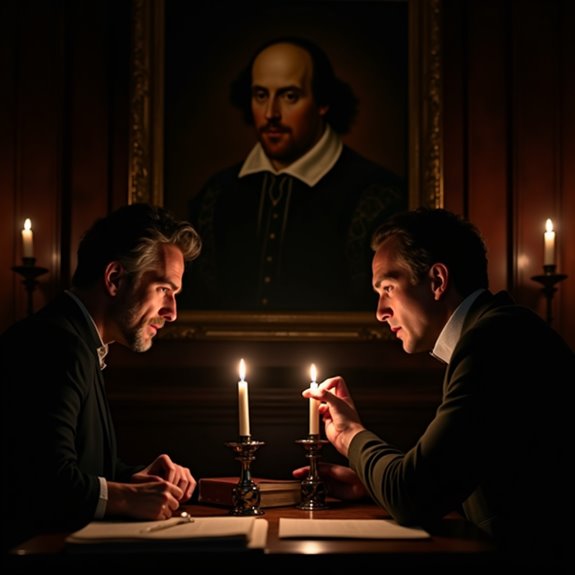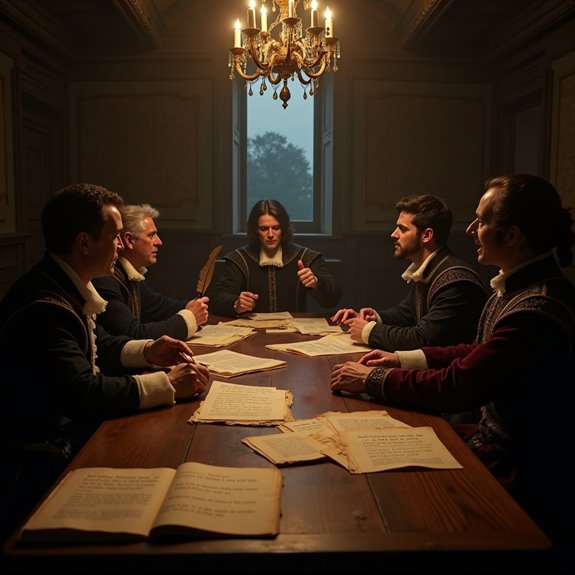The Identity of Shakespeare: A Debate
The debate surrounding Shakespeare’s true identity continues to intrigue scholars and enthusiasts alike. Questions about his authorship lead to various theories, each proposing alternative candidates with compelling arguments. As these discussions unfold, the implications stretch beyond mere authorship, touching upon the very essence of literary creation in the Elizabethan era. What might these theories reveal about the nature of creativity and collaboration in a time often romanticized for its genius?
Introduction

Although the true identity of William Shakespeare has been a topic of debate for centuries, it remains one of literature’s most enticing mysteries. Scholars, biographers, and enthusiasts continue to explore his life, searching for clues in historical documents and literary works. Many question whether the man from Stratford-upon-Avon genuinely penned the celebrated plays and sonnets, while some suggest alternative candidates, such as Christopher Marlowe or Edward de Vere. These theories often spark intense discussions, revealing a spectrum of opinions on authorship. The intrigue surrounding Shakespeare’s identity fuels ongoing research, unearths tantalizing evidence, and draws in new generations of admirers. Ultimately, the enigma deepens the appreciation for his timeless contributions to literature, regardless of who truly wrote them.
Elizabethan Era Literary Landscape

The Elizabethan Era, flourishing from 1558 to 1603, served as a vibrant backdrop for literary innovation and artistic expression. During this period, writers like William Shakespeare, Christopher Marlowe, and Ben Jonson shaped the landscape with their remarkable works. The rise of the public theater made literature accessible, attracting diverse audiences and fostering a thriving culture of performance. Poetry, particularly sonnets, gained popularity, revealing the depth of human emotion and experience. Additionally, the influence of humanism encouraged exploration of classic themes and character development. As playwrights experimented with genre and form, the era witnessed a blending of tragedy, comedy, and romance, leaving a lasting mark on literary history and paving the way for future generations of writers.
Notable Cases or Sightings

Shakespeare’s impact on the literary world extends beyond the plays and sonnets that have captivated audiences for centuries; it also sparks fascination regarding his identity. Throughout history, various notable cases and sightings have fueled curiosity about the man behind the words. In the late 19th century, an anonymous manuscript surfaced, claiming to be Shakespeare’s lost works, suggesting he might have hidden texts. Additionally, an 18th-century portrait, once attributed to Shakespeare, raises questions about his likeness. Scholars often reference the 1623 First Folio, the only definitive compilation of his plays, which has drawn attention to its missing elements and discrepancies. These instances exemplify the enduring intrigue surrounding Shakespeare’s life, adding layers to the ongoing debate about who truly authored those iconic works.
Common Theories or Explanations
While many agree on Shakespeare’s brilliance, various theories attempt to explain the mystery of his identity and authorship. Some scholars argue that Edward de Vere, the Earl of Oxford, wrote the plays due to his aristocratic background and extensive education. Others propose Sir Francis Bacon, contending his philosophical insights and literary prowess indicate he penned the works. There’s also the theory that a group of writers collaborated, sharing the success of Shakespeare’s name. Additionally, some believe William Shakespeare of Stratford-upon-Avon simply acted as a front for a more learned individual. Each theory reflects the complexity of authorship, stirring debate over the true identity of one of history’s most celebrated playwrights. The fascination continues, engaging both scholars and enthusiasts alike.
Frequently Asked Questions
What Evidence Supports the Existence of Shakespeare’s Authorship?
Historical records, including court documents and publications, indicate Shakespeare’s involvement in theatrical productions. Fellow playwrights and contemporaries referenced him, and his works were published under his name, supporting the claim of his authorship.
How Do Other Playwrights of the Era Relate to This Debate?
Other playwrights of the era often highlight the disparity between Shakespeare’s genius and their works, fueling speculation about authorship. Their styles and successes contrast sharply, intensifying the debate over who truly penned the renowned plays.
What Is the Significance of Shakespeare’s Personal Life in This Discussion?
Shakespeare’s personal life greatly shapes interpretations of his works, influencing themes, characters, and motivations. Scholars explore his background to glean insights into the societal and emotional experiences reflected in his timeless plays and poetry.
How Have Modern Adaptations Influenced Views on Shakespeare’s Identity?
Modern adaptations have reshaped views on Shakespeare’s identity by introducing diverse interpretations and contemporary elements, prompting audiences to contemplate various perspectives. As a result, they’ve sparked debates about authorship and the relevance of his works today.
Are There Any Contemporary Authors That Resemble Shakespeare’s Writing Style?
Many contemporary authors, like Tom Stoppard and Anne Tyler, capture Shakespeare’s wit and depth. Their use of language, character complexity, and thematic richness echo his style, showing his lasting impact on modern literature and storytelling.


